May 19, 2023 will go down as one of the most dramatic days in recent Toronto Maple Leafs history. Kyle Dubas was let go as GM and Brendan Shanahan gave an extraordinary press conference to explain his side of the story.
Shanahan laid out a shockingly informative timeline of events detailing when and what unfolded with Kyle Dubas’ contract over the past year, dating back to when the decision was made last summer not to extend the Leafs GM. Most focus centered on the wild swing of events over the past week, from a contract being proposed last Sunday by Shanahan to Dubas up through the decision to fire him Friday morning. It was a surprising reveal of straightforward information, but still, many questions are left unanswered and we have yet to hear Dubas’ side of the story.
Regardless, Kyle Dubas is no longer the GM of the Toronto Maple Leafs and after Jason Spezza’s resignation later on Friday, it appears that more jobs will be open in the front office. With a new GM incoming, you’d think they will install a new coach, too, which is another potential vacancy in the near future.
So much is set to change with this organization, and with change comes anxiety. Much of Leafs Nation was feeling it yesterday, so today we’re here to investigate exactly that: the exit of Kyle Dubas, whether it’s time to panic, and some thoughts on what comes next.
The firing of Kyle Dubas
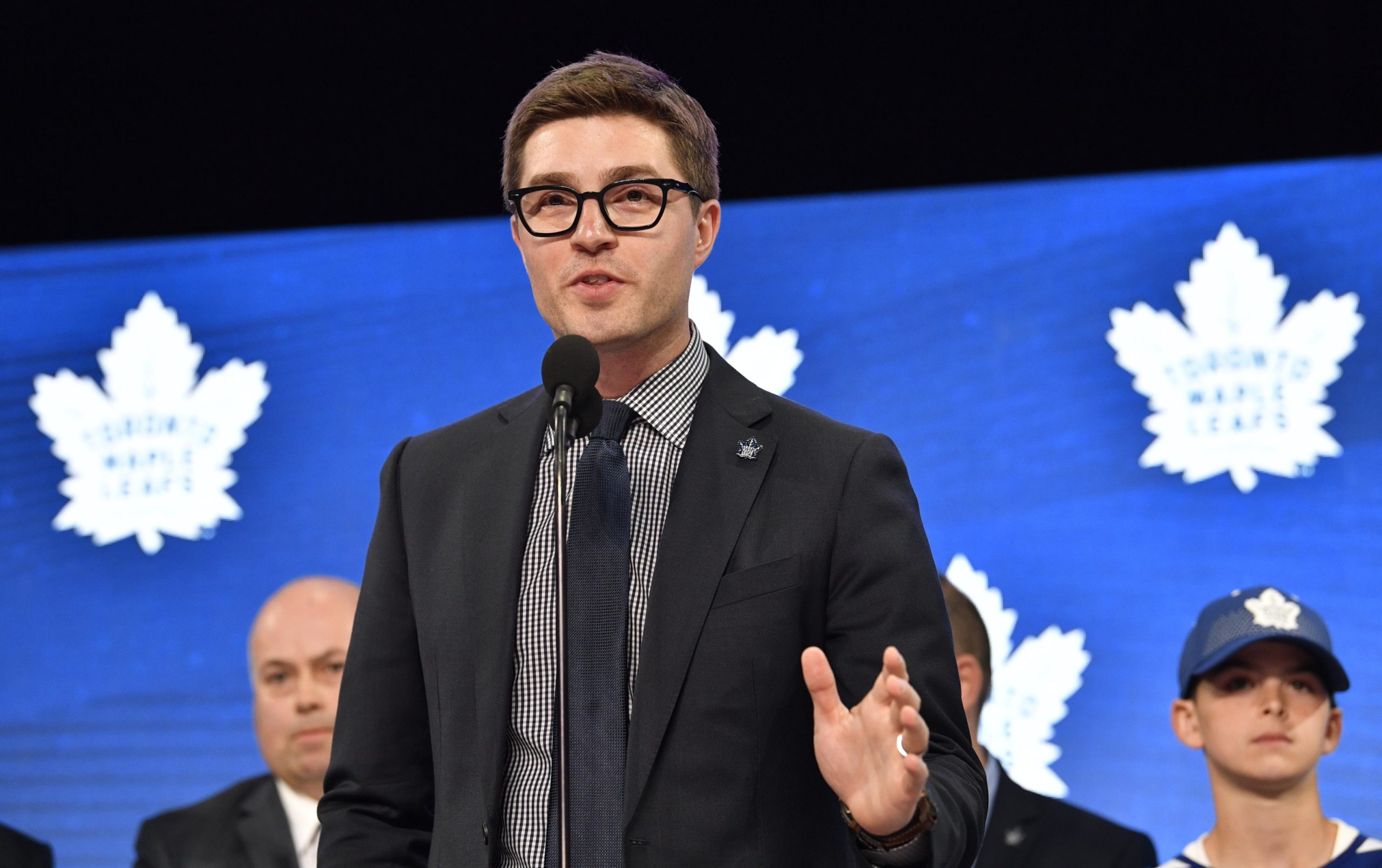
When the announcement was put out by the Leafs‘ social media team that the club had “decided to part ways with General Manager Kyle Dubas,” many were trying to scrutinize the exact language used and what it meant. I was willing to wait for Shanahan’s press conference; the wording probably would’ve been similar whether the team had fired Dubas or Dubas had decided to leave. I felt that no pro sports team was going to admit publicly that a GM they wanted back in the role had quit on them.
So I was quite intrigued to hear what Shanahan had to say and what exactly went down between the two sides. It didn’t take long in Shanahan’s press conference to figure out who had initiated what. Shanahan had fired Dubas. Canned him. Cut him loose. Whichever phrase you prefer, the Leafs‘ President had dumped Dubas, not the other way around. That was the biggest takeaway I had right from the jump.
Then more details came into view. The series of developments was laid out by Shanahan as such:
- Last offseason, Shanahan notified Dubas that the team would not be giving him an extension.
- After the trade deadline in mid-March, Shanahan told Dubas that he’d seen enough to make Dubas the GM moving forward and that while Dubas should think it over, if Dubas was ready, Shanahan would inform ownership of his plan.
- Dubas came back a week later and said he wanted to move forward, giving Shanahan the name of his agent and saying he didn’t want to be involved in the discussions.
- Shanahan felt the discussions with the agent were going well and that while Dubas didn’t want the “distraction,” the issue would have to be settled after the second round, whether the Leafs moved on or not.
- Shanahan believed he had a framework of a deal that met Dubas’ desires ready when the season ended and proposed the deal to him on Sunday, and the two discussed it in Shanahan’s office. Shanahan notes that he and Dubas did discuss the strain that being in the NHL puts on their families. Shanahan also notified Dubas that he was not planning to speak to the media until the contract was handled and that he believed Dubas shouldn’t either, but Dubas insisted and Shanahan respected that desire.
- Dubas’ comments at Monday’s press conference about being unsure whether or not he would return as GM caused a “dramatic shift in (Shanahan’s) thinking,” realizing that Dubas may seriously not want to come back.
- The two men did not meet Tuesday.
- The two men met on Wednesday and had a long discussion, one that did not provide Shanahan with clarity on what Dubas was planning to do. Shanahan thus was forced to further consider the possibility that the team may go into the 2023-24 season with a new GM.
- Dubas told Shanahan on Thursday that his agent would speak to Shanahan and that Dubas would reach out to Shanahan as well. Dubas’ agent presented Shanahan with a “new financial package,” but Dubas himself did not contact Shanahan during the day. Shanahan received an email from Dubas in the evening saying that he wanted to return as GM.
- Shanahan felt at this stage that a “gap had risen within the contract status” and that upon receiving the email he, “had gotten to a different place about how (Shanahan) felt about the future of the Toronto Maple Leafs and what was best”
- Shanahan went to bed with that feeling, woke up, drove to Dubas’ office, and dismissed him.
I know that bullet point list is long to read through, but I felt it was important to lay out a timeline of everything that we are told happened, if we are to analyze the decision-making from Shanahan.
There are two ways of viewing this: You can take everything that Shanahan said at face value, or you can see it as a presentation of the part of the iceberg that is visible above water but not everything beneath it. If you choose to believe the former, Shanahan comes off sounding like a deeply emotional, unstable decision-maker who completely reversed course in the span of a few days based on no more than vibes. If you choose to believe the latter, this looks like a raw framework of events that happened, but leaves out considerable context to justify and rationalize the ultimate decisions made by both parties.
I choose to believe the latter. In most all situations in life, there is more than meets the eye, especially when it deals with the personal relations between two human beings who have worked closely together for nine years, not to mention there’s the element of ownership that is very real and completely absent here. People have spent a half-century trying to figure out exactly how and why The Beatles broke up; I feel like the same level of critical thinking and scrutiny should be applied to figuring out why Brendan Shanahan and Kyle Dubas broke up. It may look messy and confusing on the surface, but there is plenty more lurking below ground that must be dug into.
After all, we haven’t just emerged from a coma, with this press conference being the only information available to us. There has been reporting for some time that adds important context. Elliotte Friedman has reported for some time that the decision not to extend Dubas last offseason was a decision made by ownership (particularly the two telecomm companies, not Larry Tannebaum), not Shanahan. That’s a pretty important piece of information. Secondly, a schism between Shanahan and Dubas had been hinted at for some time, made public by the fact it has been Brandon Pridham and Jason Spezza sitting with Dubas in the box at games, not Brendan Shanahan as had been the case in the past. James Mirtle of The Athletic went into more detail about this on his podcast Friday evening, saying that Dubas and Shanahan are “two very different men with big personalities,” implying a source for the divide. Others have suggested that Dubas and Shanahan had been tussling over control, with Shanahan wielding (and presumably using) veto power over Dubas’ decisions.
Yet, as the timeline of events suggests, Shanahan was comfortable with retaining Dubas, No matter what rocky feelings there may have been, he supported Dubas’ vision for the team, wanted to keep him as GM, and was preparing to inform ownership (again implying that it was not a done deal that ownership would be on board). Shanahan was willing to support Dubas in mid-March and was planning to do so at the start of this week. That reality is what has driven some to call Shanahan’s decision-making this week irrational, but I’m not sure I agree with that characterization. What we know is that Shanahan supported Dubas and wanted to retain him as GM based on what he was aware of on Monday morning. That is *not* the same thing as wanting to retain Dubas at all costs.
We’re very aware of this concept when it comes to player contracts in sports. You may want Michael Bunting to re-sign with the Maple Leafs for a $4M cap hit, but you would certainly not want him to be re-signed for a $10M cap hit. Brendan Shanahan may well have wanted Kyle Dubas to return as GM and supported him doing so, within the confines he is comfortable with. That could be fiscal, either his own red line or one set down by his bosses in ownership. It could also be in terms of power, wanting Dubas to return as GM in an arrangement similar to their present state, but not one with expanded power. I don’t know if he had such limits on his support for Dubas and what they were if they did exist, but I would bet on some existing, and believing that they did exist makes Shanahan’s thought process go from seemingly irrational and moody to calculated and precise.
Another such red line may have existed with what happened at Dubas’ press conference on Monday, which in the timeline appears to be the massive turning point. If Shanahan did indeed tell Dubas not to speak to the media and he did it anyway, then Dubas was already playing with fire amidst a negotiation. Dubas then informing the media he was not sure if he wanted to return as GM clearly bugged Shanahan and appears to be another red line of sorts. Nick Kypreos of the Kyper and Bourne radio show made the point after Dubas’ presser that telling the media about his indecision should be interpreted as a negotiating tactic and it may or may not have been (I’d lean towards the affirmative), but based on Shanahan’s ultimate decision and language used on Friday, we can feel almost certain that Shanahan saw it as such. Maybe not 100% at the time, but once Dubas’ agent approached him with a new contract offer on Thursday, how else could Shanahan have viewed it?
If two sides are negotiating and seem close, then one side goes public with a threat of walking away from the table (even if it is couched around familial concerns) and follows it up two days later with a new offer, that will nearly universally be viewed as an escalation and a pure negotiating tactic, not a genuine expression of the heart. Rightly or wrongly, that’s just how it typically goes. Dubas may well be speaking from the heart. I don’t doubt that there has been a strain put on his family running the Toronto Maple Leafs of all teams. Maybe the words just got away from him and he didn’t intend to pour gasoline on a fire, but that is what happened.
Shanahan takes plenty of heat here, but Dubas also bears plenty of responsibility for why he is not coming back. Had he informed Shanahan on Wednesday when they met that he didn’t mean what he said and he wished to return, he would likely be back. Had he done that on Thursday, the issues also would’ve likely been patched up. But, according to Shanahan, Dubas did not do so, instead giving a non-committal answer in person and countering via his agent on Thursday with a new offer that was quite different. Put together, Dubas’ words and actions (as relayed by Shanahan) read like a man playing a high-stakes game of chicken with his job and ending with a firing when the boss decides to put an end to this and grab the bull by the horns.
Now, it’s entirely possible that Shanahan is cutting corners or bending the truth to give us a version that makes him look good. We won’t know for certain until Dubas speaks and even then there will still probably be unknown parts of the discussion. We will probably never know exactly what happened here.
One such question that we may never know the answer to: What offer did Dubas propose on Thursday? How different was it from the offer on the table? Let’s say, just for the sake of argument, that Dubas had been offered $5M salary and the GM job underneath Shanahan and Dubas instead proposed $8M salary and full autonomy (Shanahan being moved out of hockey operations). Those two offers are miles apart and in most negotiations — especially one as seemingly in the late stages as this one was — would be interpreted as a detonation of affairs and often ends in a falling apart of the negotiations altogether. But on the flip side, if Dubas’ counteroffer wasn’t terribly different than what was on the table, Shanahan is the one who comes away looking frantic and hasty by ending the negotiations.
Unfortunately, we may never know what the difference in offers were and until that point, we won’t know the full story here. I don’t blame Shanahan for wanting a GM who was 100% all-in on being the GM and Dubas, based on what was said to the media on Monday and in this timeline of events, wasn’t all the way there. I also don’t blame Shanahan for wondering if Dubas was up for the job, given his public comments about the stress. There is nothing wrong with feeling the pressure of this job or acknowledging it or not liking it… but it also may mean you aren’t fit for the job.
It’s not like Shanahan is completely immune, either. He has dealt with the stress of being a public figure in this job, too, and if the Leafs fail again in the next season or two, Shanahan will be the one in the streets of Pamplona with the bulls chasing him. Shanahan was also an NHLer for two decades, playing on many Cup-contending teams in Detroit as a star player when the pressure to win big was about as intense as it can be in an American market. We can sympathize with the pressure Dubas must have been feeling, but Shanahan, unlike all of us, actually has a great deal of knowledge of what that’s like. I wouldn’t be surprised if his experiences with the pressure and a feeling that Dubas may not be up to handling it after Monday was a part of the thought process here.
In the end, Kyle Dubas has been fired as Leafs GM because he broke some barrier of Brendan Shanahan’s (and perhaps MLSE’s), be it financial, power-related, personal, or estimation of competency under pressure. That’s the story. He broke it at some point this week, perhaps multiple times, perhaps in a gradual build-up. There likely was some ill will previously, but Shanahan claims he was willing to get past it and bring Dubas back. And then something tipped it over the edge. There are many different possible threads that led to this, but until Dubas speaks, we won’t know. And even then, we may never know. We have to make peace with that reality and now figure out what happens next.
Is it time to PANIC???
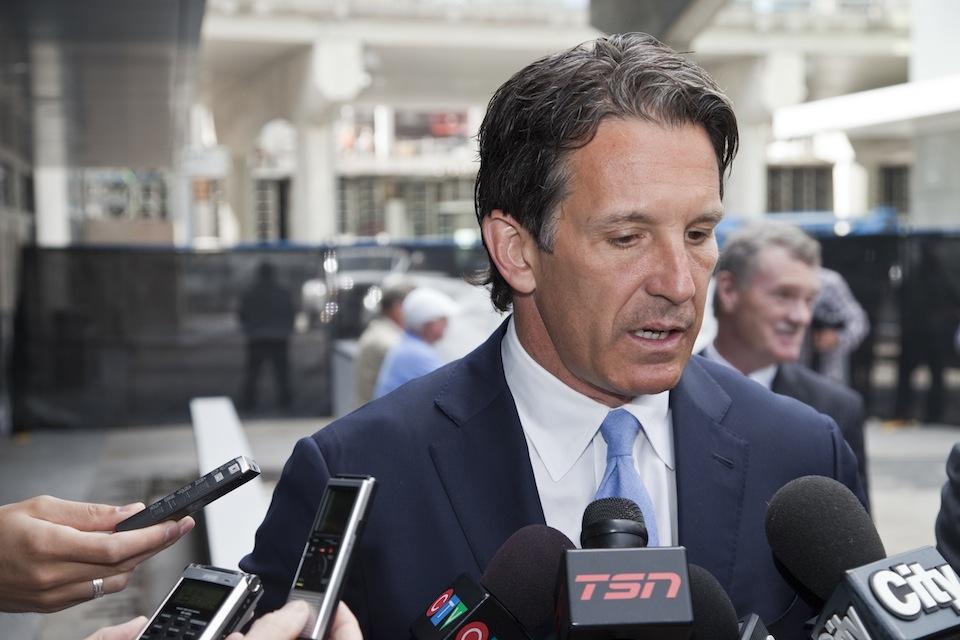
So Kyle Dubas has been fired and the Leafs are in need of a new GM. How concerned should we be? There is a strange aura around a large segment of Leafs Nation (particularly one prevalent on Twitter) who are so scarred by the John Ferguson Jr., Brian Burke, and Dave Nonis years (perhaps some oldies with Ballard-era trauma, too) that a dichotomy has been set up with Kyle Dubas on one side and meatheads on the other. Either it’s Dubas or a wrecking ball who will set the franchise back 50 years. Given the wide range of GMs across the NHL, that seems like a false binary.
Brendan Shanahan has overseen this organization from the spring of 2014. He was the one who chose to go into a full rebuild, the rebuild that gave the team two of its foremost stars. Shanahan oversaw the drafts that featured the selections of William Nylander, Mitch Marner, and Auston Matthews. Shanahan undoubtedly made mistakes along the way, but he is the only person in the front office who has been in the same job from April 2014 to the present — the one true constant for the team going from a gong show to a perennial 100+ point squad for the only time in franchise history. Dubas was with him all that time, but it was Shanahan’s decision to hire Dubas, to promote him up the food chain, to let Lou Lamoriello walk, and to choose Dubas over Mark Hunter to be GM. Based on all this, the idea that Shanahan is completely untrustworthy to make a hire seems odd to me. If you believe Dubas to be a genius GM, you have to at least give a little credit to the guy who unearthed him from the OHL, brought him to the NHL, and gave him immense power.
The notion that anything good the Leafs have done over the past five years is all Dubas and anything bad has been all Shanahan is nonsensical and not substantiated by much of any evidence. Moreover, Shanahan praised Dubas’ work with the team frequently in yesterday’s press conference, showing that he is in agreement with Dubas’ vision for the team broadly. I struggle to see how the base assumption should be that Shanahan is a dolt who will bring in a profoundly incompetent numbskull to run the team. Maybe he will! But based on what we know, that feels like a bit of a stretch, one permeating the fanbase due to the experience of being a Toronto Maple Leafs fan between the years 2006 and 2014. In fact, I’d argue there’s more of a case to be made that Shanahan and Dubas should’ve been fired together because of their shared vision and culpability than there is that Shanahan has Jim Benning on speed dial for any vacancy.
What seems to have fans worried is Shanahan’s answer to the question asked about what he’s looking for in a new GM, stating that, “having an experienced GM would be an attractive quality.” Generally speaking, there aren’t many good experienced GMs who are out of work; logic says that if they’re good at their jobs, they wouldn’t be out of work. A list of possible candidates circulated by Chris Johnston Friday night who fit the description could best be described as a who’s who of the cellar when it comes to GMing, with the exception of Brad Treliving, who I will get to shortly. Obviously, if Peter Chiarelli or Ron Hextall is hired as the next GM, then we have a major problem on our hands. But I am choosing to reserve judgment until we see which direction Shanahan goes in.
It’s also not clear how much Shanahan will value that experience. Obviously, it’s an attractive quality because a good experienced GM will always be preferable to an inexperienced GM, who could be either good or bad. But will it be decisive in Shanahan’s decision-making? Impossible to say at this time.
I don’t feel it is time to panic, at least not until we see who Shanahan hires. Kyle Dubas was a good GM, and I think he will do a good job wherever he goes next. But it is crazy to claim that he is the best GM in the league or a piece of the team that could not be improved on — not when they have won one playoff round over his tenure despite strong regular-season performances. Dubas seems like a smart guy who makes quite a few good decisions and always seems to have a logical process, but the results aren’t there for a “name your own price”/blank check sort of perception in my eyes.
In my season-ending piece last week, I was open to his return if he was willing to make some changes to the team (and he did sound like it on Monday), but also was ambivalent as a whole, willing to consider a new GM under the “fresh set of eyes” theory that our colleague Anthony Petrielli has been arguing for. Yes, you can do a lot worse than Dubas, but given five years of playoff results, you can also do better.
I’d actually argue that the biggest reason to panic at this time has nothing to do with Dubas no longer being the GM in terms of transactions or decision-making, but the personal relationship side, particularly with the players. As many have pointed out, the core players were exceptionally close with Dubas (perhaps Dubas’ biggest undoing) and thus will probably be upset about his exit. Therefore, it may be harder to get Auston Matthews and William Nylander to sign extensions before July 1 since a new GM has to sell them on a vision and they wouldn’t have familiarity with that GM. I was of the belief that the Leafs cannot let Auston Matthews walk for nothing and thus signing an extension this summer is a red line of sorts. Getting him signed might be harder now, which is my biggest *gulp* moment.
That said, if Auston Matthews ultimately chooses to leave the Toronto Maple Leafs because his buddy Kyle Dubas was not retained as GM, all that says to me is he is more interested in making friends than winning hockey games and not much could have been done here realistically. Naturally, the new GM needs to be a smart guy with a good vision for the team, but if that is presented to Matthews and he chooses to bounce because he wants to play with and for his friends, that is a player with different priorities than those who have historically won Stanley Cups and would be the greatest indicator of what the crux of the problem with the club is.
With Jason Spezza leaving, Shanahan and the new GM will need to fill out some spots inside the front office, but that is rather customary when there is turnover at the top. Not a major reason to panic. Sheldon Keefe is 99.9999% likely to be fired as well by whichever new GM is hired — and that is, in the opinion of your author and other authors at this site, a reason to celebrate rather than panic. A new coach is badly needed for this team, and I will be interested to see which direction they go on that front as well. It’s possible that the new GM and new coach could be a downgrade from Dubas and Keefe, but it’s also possible that they could be the mix necessary to get this team over the hump. Until we know which, I wouldn’t say it’s panic time.
A few thoughts on what comes next
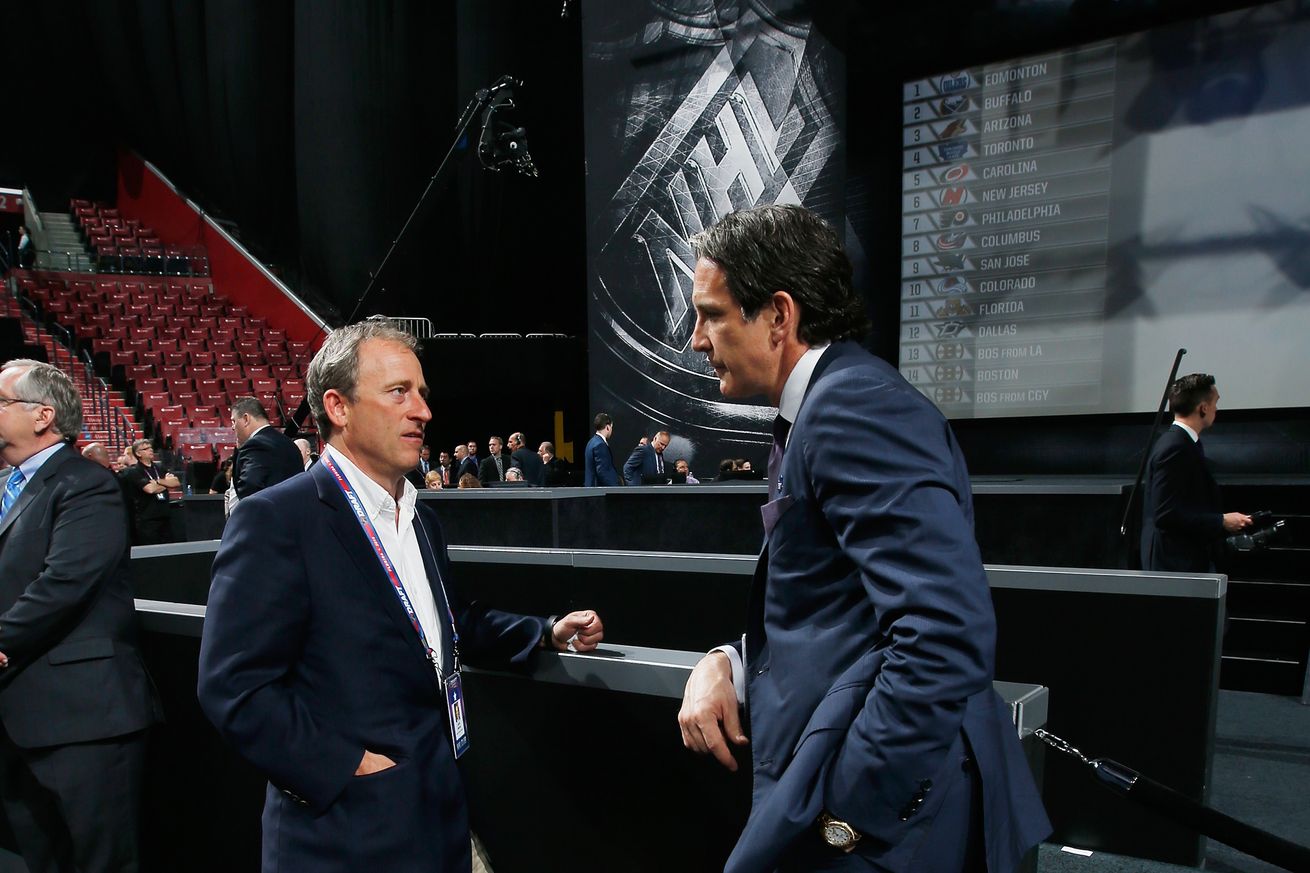
I won’t go too deep into thoughts on the GM search — there may be more in-depth pieces on the way about that in the coming days — but I do have a few thoughts I wanted to get out there. At face value, of the “experienced GMs” bucket, there are three names I can currently think of that I would have time to listen about: Brad Treliving, Mike Gillis, and Ray Shero. Again, not that I’m sold on any of these names, but these are the individuals I can think of who have done the job and have shown me enough to put them in a hunt alongside the likes of talented AGMs like your Eric Tulsky types.
Treliving is not the must-hire GM like some of the hockey media makes him out to be, but I also think fan perception of him is giving him a raw deal. He’s a solid NHL GM, but my main concern would be that his greatest strength as a GM was his drafting and that’s not exactly where the Leafs are at in their life cycle. In terms of signature skills, they may be better off looking at Gillis, who wasn’t much of a drafter in Vancouver but put the right pieces together around the Sedin twins to win two Presidents’ Trophies and come one win away from winning the Stanley Cup (in a series where his team controlled the run of play but lost due to an unparalleled goalie effort in the other net).
Ray Shero was not a perfect GM in Pittsburgh or New Jersey, but he won a Stanley Cup and provided some positive pieces around Crosby and Malkin. With the Devils, he began laying some of the groundwork for their very good team now. None of these executives are perfect, but they have shown enough to be deemed competent enough in my eyes to be in the discussion for the successor to Dubas.
There’s also the possibility that the Leafs could go out and try and poach a GM, with Elliotte Friedman name-dropping Doug Armstrong of the St. Louis Blues on his podcast Friday. Armstrong would be another strong candidate — a Cup-winning GM who acquired nearly every player for that team and built a Blues team that was perennially competitive throughout the 2010s. If he had an interest in switching to Toronto, I would have an interest in that as well.
There are options here, not to mention the cadre of young up-and-coming AGM names who would be unknown but have a reason for belief (high risk, but also high upside). A number of the best GMs in the league were first-time GMs when they were hired, so I wouldn’t be opposed to going that route, either.
No matter who is hired, though, that person is going to have to hit the ground running. Shanahan needs to use the long weekend to assemble a list of candidates, reach out, schedule interviews, and get to work quickly. You need to have a GM in place ideally by the end of May so that a coach could then be hired, plans could be put together for the offseason ahead of the draft in late June, and discussions can be had with Matthews and Nylander.
It is a compressed timeline that is inevitably going to produce a whirlwind of news moving forward. Shouldn’t be a moment of dull time this summer for the Toronto Maple Leafs.

















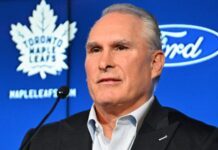
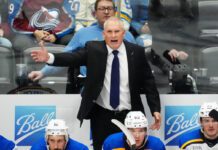


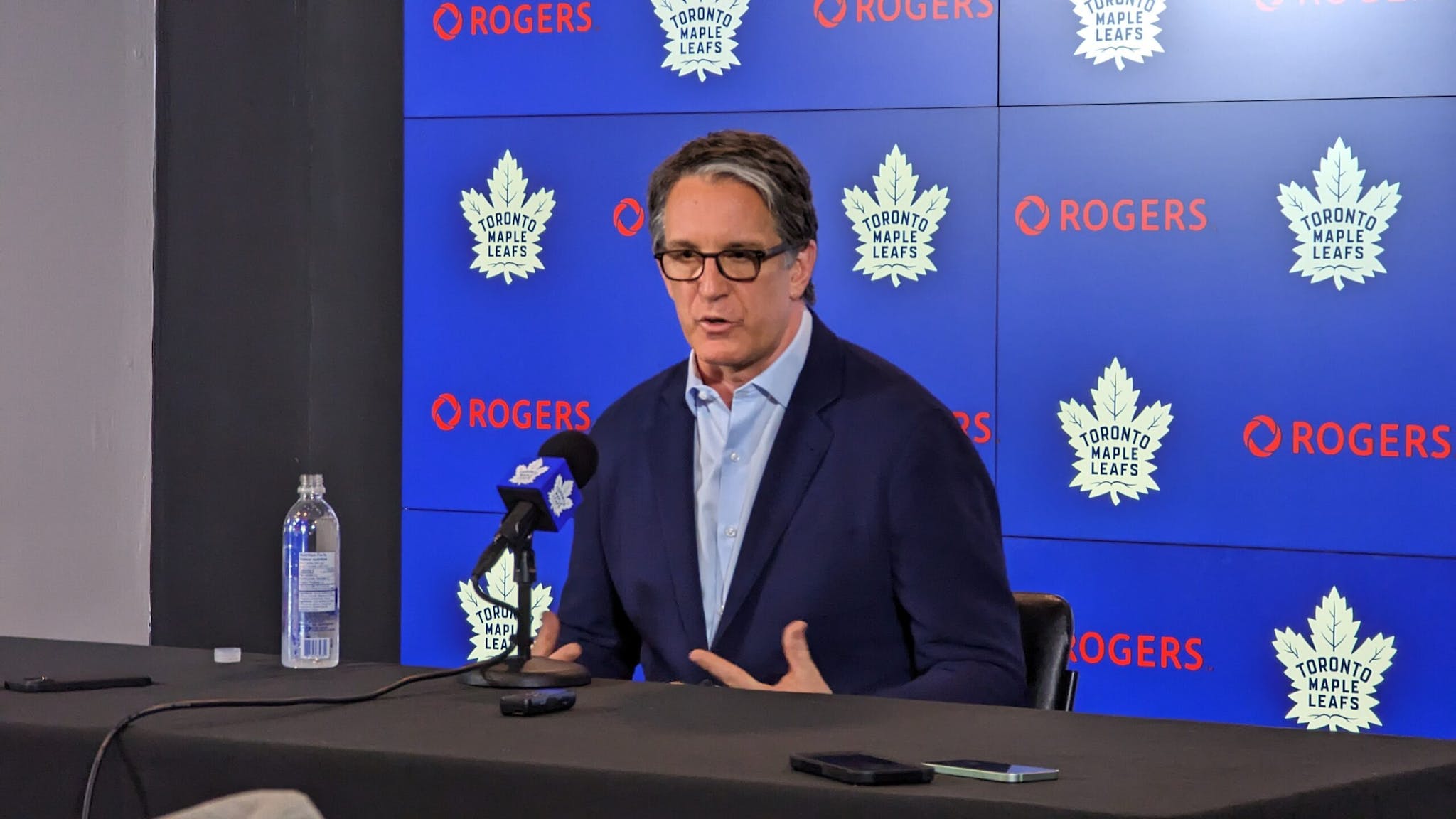








![New Leaf Anthony Stolarz on the opportunity in Toronto: “In Florida, I knew my role as a backup… Now, [Joseph Woll] and I are competing for starts… As a goalie, that’s all you can ask for” Anthony Stolarz, Stanley Cup win, now Maple Leaf](https://mapleleafshotstove.com/wp-content/uploads/2024/07/anthony-stolarz-sc-100x70.jpg)
